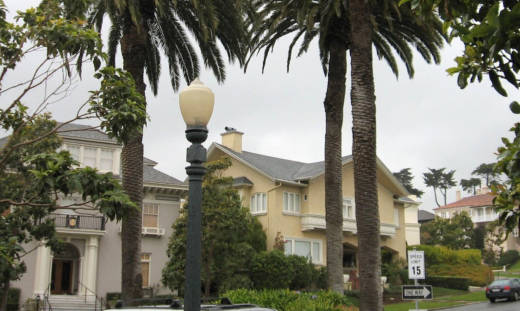The whole story is well worth a read over at the Chronicle.
Presidio Terrace was originally built as an enclave for white residents, as Curbed San Francisco noted last year. The Virtual Museum of San Francisco quotes an ad from 1906, bemoaning the fact that Japanese and Chinese residents were moving into neighborhoods and saying, "There is only one spot in San Francisco where only Caucasians are permitted to buy or lease real estate or where they may reside. That place is Presidio Terrace."
Presidio Terrace, along with many other wealthy neighborhoods, continued to prohibit ownership by nonwhites until 1948, the Chronicle notes. That year, the Supreme Court blocked such racial covenants from being enforced. (Some neighborhoods tried to uphold their racial covenants even after they were illegal; member station WAMU has reported on an example in Washington, D.C.)
These days, Presidio Terrace is gated and guarded. SFGate described it as "very private and swank." San Francisco's late former mayor Joseph Alioto used to be a resident, as did Sen. Dianne Feinstein.
According to a lawsuit filed by the Presidio Terrace Association, the neighborhood's current residents didn't find out about the sale of their private road until this May — more than two years after it happened.
It all started with a $14 bill. Or, well, a lot of $14 bills.
The homeowners association says in the lawsuit that, based on city records, "the property taxes on the Common Area have been less than $14.00 annually for the past several years."
The taxes weren't paid for "many years," the association says, because the city was sending the bills to an address "associated with an accountant who last performed work for the Association in the 1980s." A warning that the account was in default, owing $994.77, was sent to the same address. It, too, went unnoticed.
A few months later, the street was auctioned off.
(Incidentally, are you wondering how much each resident paid to that HOA? Based on news reports, it's well north of $500 a month.)
The city should have known the address was wrong, the residents say. They're calling for the sale to be rescinded.
The office of the treasurer-tax collector does not seem persuaded by that argument. A spokeswoman told the San Francisco Chronicle there was nothing they could do.
And, the spokeswoman told the paper, "Ninety-nine percent of property owners in San Francisco know what they need to do, and they pay their taxes on time — and they keep their mailing address up to date."
Copyright 2017 NPR. To see more, visit http://www.npr.org/.
9(MDAxOTAwOTE4MDEyMTkxMDAzNjczZDljZA004))

9(MDAxOTAwOTE4MDEyMTkxMDAzNjczZDljZA004))
